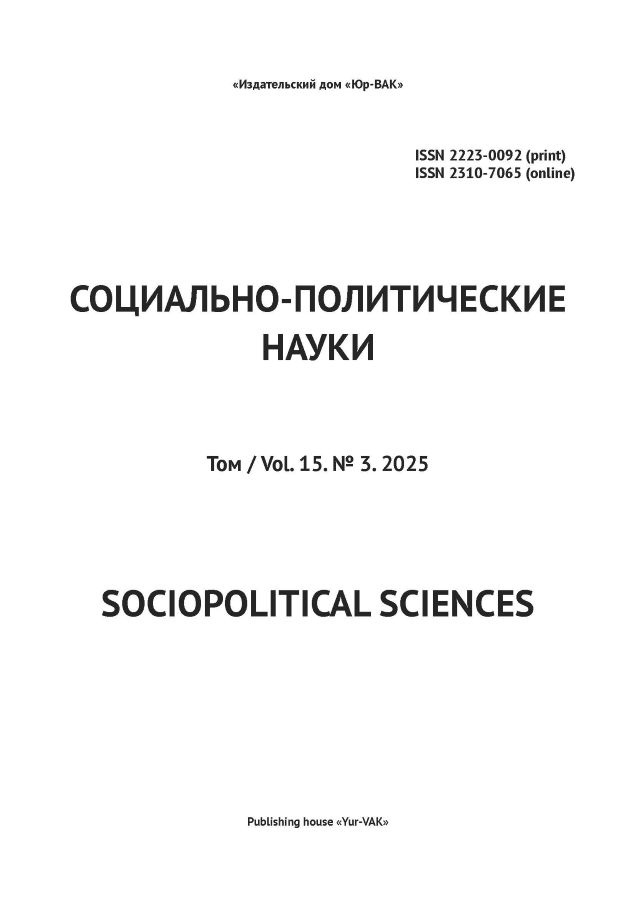A Sociological Study of Media Literacy in Education Management
- 作者: Glebova I.S.1, Belozerova Y.M.1, Garaganov A.V.2
-
隶属关系:
- Institute of Cinema and Television
- Financial University under the Government of the Russian Federation
- 期: 卷 15, 编号 3 (2025)
- 页面: 169-175
- 栏目: Sociology of management
- URL: https://journals.eco-vector.com/2223-0092/article/view/687903
- DOI: https://doi.org/10.33693/2223-0092-2025-15-3-169-175
- EDN: https://elibrary.ru/TCHYOH
- ID: 687903
如何引用文章
详细
The article presents the results of a sociological study conducted using in-depth expert interviews with representatives of the field of education and management, devoted to the possibilities of introducing media literacy into the management of modern education in the context of digital transformation. The novelty of the work lies in the analysis of both prospects and risks, as well as in the formulation of recommendations for effective management of the educational space. Concerns and barriers in the views of experts involved in the educational process have been identified. The main challenges are considered: information security, a shortage of qualified teaching staff, insufficiently developed digital competencies of students and teachers, the high cost of introducing modern media tools and the imperfection of the regulatory framework. Special attention is paid to the possibilities of using digital skills to improve the quality of education, develop critical thinking and form a responsible attitude to information. Recommendations are given on the development of media literacy in educational institutions, including the need for legal regulation, support for innovation, development of secure infrastructure and education of the population about high-tech educational projects.
全文:
作者简介
Irina Glebova
Institute of Cinema and Television
编辑信件的主要联系方式.
Email: iglebova@mail.ru
SPIN 代码: 2649-3869
Cand. Sci. (Polit.), Associate Professor; Dean of the Faculty of Production
俄罗斯联邦, MoscowYulia Belozerova
Institute of Cinema and Television
Email: avuzto@yandex.ru
SPIN 代码: 3387-2576
Cand. Sci. (Econ.), Associate Professor; Head of the Department of Production Skills
俄罗斯联邦, MoscowArtur Garaganov
Financial University under the Government of the Russian Federation
Email: arturcompany21@gmail.com
ORCID iD: 0000-0002-7886-2896
SPIN 代码: 6780-5644
Scopus 作者 ID: 57142482000
Researcher at the Locomotives of Growth Center of the Department of Sociology
俄罗斯联邦, Moscow参考
- Artemenko M.A. Youth media literacy in the context of Internet security. Intellectual Potential of the 21st Century: Stages of Cognition. 2012. No. 10-1. Pp. 25–37. (In Rus.). EDN: RPTWEH.
- Bauman Z. Fluid modernity. S.A. Komarov (transl. from English). Moscow; St. Petersburg: Piter, 2008. 238 p. ISBN: 978-5-469-00034-1. EDN: QOABEJ.
- Belozerova Yu.M. Module 1. Development and implementation of projects in the field of culture, creativity and creative industries in the higher education system: Methodological recommendations for mastering the educational program. In: Development and implementation of projects in the field of culture, creativity and creative industries in the higher education system. Methodological recommendations for the educational program of additional professional education and a collection of scientific articles of the All-Russian scientific and practical conference “Development of a project approach to training specialists for the creative economy” (Moscow, October 25, 2025). Moscow: Rusains, 2025. Pp. 8–19. EDN: FKWKVB.
- Vershinina I.A., Martynenko T.S. Smith J. The Internet is not what You think it is: History, philosophy, warning. Questions of Philosophy. 2025. No. 1. Pp. 209–212. (In Rus.). doi: 10.21146/0042-8744-2025-1-209-212. EDN: IQKDCY.
- Voynilov Yu.L., Maltseva D.V., Shubina L.V. Media literacy in Russia: Cartography of problem areas. Communications. Media. Design. 2016. Vol. 1. No. 2. Pp. 95–114. (In Rus.). EDN: YSJKUP.
- Volodchenko O.N., Eremochkin V.A. Media literacy as a factor of information security of society. MediaVector. 2022. No. 6. Pp. 34–38. (In Rus.). EDN: AXYBDY.
- Garaganov A.V., Vershinina I.A. Cultural factors of (not) trust in artificial intelligence on the example of cinema. Power. 2024. Vol. 32. No. 6. Pp. 214–220. (In Rus.). doi: 10.24412/2071-5358-2024-6-214-220. EDN: YXSXWD.
- Glebova I.S. “Creative battle” as a creative tool for determining the current control of students’ academic performance. In: Strategic guidelines for the development of higher education: Human resource management. Collection of articles of the I All-Russian Forum of Teachers of Higher Education (Moscow, November 18–19, 2024). Moscow: KnoRus, 2025. Pp. 556–562. EDN: MZCPKI.
- Kanyuk A.S., Garaganov A.V. Application of intellectual educational technologies in the university environment. Bulletin of GSU. 2024. No. 4. Pp. 156–163. (In Rus.). EDN: FWKJAF.
- Castells M. The information age: Economics, society and culture. O.I. Shkaratan (transl. from English under the sci. ed.). Moscow: Higher School of Economics, 2000. 608 p.
- Lyapuntsova E.V., Belozerova Yu M., Naumova T.A. The All-Russian Forum of teachers of Higher Education “Academic Community – 2024”. Bulletin of the Udmurt University. Series: Philosophy. Psychology. Pedagogy. 2024. Vol. 34. No. 4. Pp. 439–443. (In Rus.). doi: 10.35634/2412-9550-2024-34-439-443. EDN: HBSQHL.
- Augusta E.N., Baburina N.A., Babusova N.B. et al. Higher education teacher. Practical situations. Textbook. Moscow: KnoRus, 2024. 170 p. ISBN: 978-5-406-12406-2. EDN: RRBGHQ.
- Savina O.V. Media literacy as a factor in countering disinformation and propaganda in the digital environment. The Post-Soviet Continent. 2025. № 1 (45). Pp. 64–76. (In Rus.). doi: 10.48137/23116412_2025_1_64. EDN: BLGFEA.
- Solntseva E.S. On the issue of the priority of skills in the field of youth media literacy. Pedagogy and Education. 2022. No. 4. Pp. 48–59. (In Rus.). doi: 10.7256/2454-0676.2022.4.39170. EDN: KMRDBE.
补充文件








